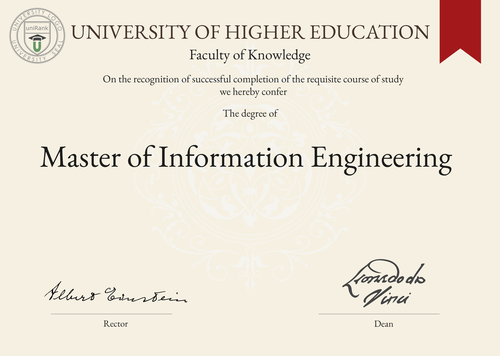
Master of Information Engineering (MIE)
Guide to Master of Information Engineering Program/Course/Degree
Master of Information Engineering (MIE)

Program Name:
Master of Information EngineeringProgram or Degree abbreviation:
MIEDuration range:
The duration of the Master of Information Engineering program can vary depending on the country or university. Typically, it ranges from 1 to 2 years.Tuition range:
The tuition fees for the Master of Information Engineering program can vary based on the country or university. The range can vary from affordable to expensive, depending on the location and reputation of the institution.Overview:
The Master of Information Engineering program is designed to provide students with advanced knowledge and skills in the field of information engineering. It focuses on the application of engineering principles to the design, development and management of information systems.Curriculum Overview by year:
The curriculum of the Master of Information Engineering program is structured to cover a wide range of topics. In the first year, students typically study foundational courses such as data structures, algorithms, database management, computer networks and software engineering. In the second year, they delve into more specialized areas such as machine learning, artificial intelligence, cybersecurity and big data analytics.Key Components:
The key components of the Master of Information Engineering program include theoretical knowledge, practical skills, research projects and industry internships. Students gain a deep understanding of information engineering principles, develop proficiency in programming languages and tools and learn to apply their knowledge to real-world problems.Career Prospects:
Graduates of the Master of Information Engineering program have excellent career prospects. They can pursue various roles in industries such as technology, telecommunications, finance, healthcare and consulting. Potential job titles include information engineer, data analyst, software developer, systems architect, cybersecurity specialist and project manager.Salary Expectations:
The salary expectations for Master of Information Engineering graduates can vary depending on factors such as the country, industry, job role and level of experience. Generally, professionals in this field enjoy competitive salaries, with the potential for growth as they gain more experience and expertise. For a more accurate understanding of salary expectations, you can utilize the Job Sites Search Engine, from our sister site jobRank, which searches over 4,600 job sites worldwide. Make sure to specify not only the job title but also the country you are interested in.Conclusions:
It is important to note that the duration, tuition fees, curriculum, key components, career prospects and salary expectations of the Master of Information Engineering program can vary based on the chosen country or location of study, as well as the chosen university. Prospective students are advised to research and compare different options to find the program that best suits their needs and goals. Visitors can search for where this specific degree, Master of Information Engineering, is offered anywhere in the world through the uniRank World Universities Search Engine, which provides comprehensive information on universities worldwide.World Universities Search Engine
search for Master of Information Engineering (MIE) and add the Location (country, state etc.) or specific University you are interested in studying at.
Query examples:
- Master of Information Engineering (MIE) United States
- Master of Information Engineering (MIE) United Kingdom online
- Master of Information Engineering (MIE) Australia international students
- Master of Information Engineering (MIE) University of California
- Master of Information Engineering (MIE) University of London tuition fees
- Master of Information Engineering (MIE) University of Sydney scholarships
Share Program/Course
Interesting? Share this program/course/degree info with your friends now.